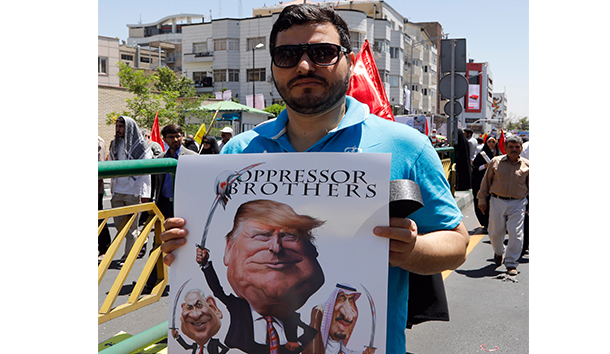The conventional view among antiglobalist conservatives is that President Donald Trump’s nixing of the Iran nuclear deal, coupled with the much-heralded relocation of the U.S. embassy to Jerusalem, is bad news. Their arguments are clear. America seems to be moving closer to another war of choice in the Middle East—potentially far more costly and devastating than the disaster in Iraq—and Washington has discarded any pretense of impartiality in the Israeli-Arab dispute, which makes progress in the stalled “peace process” impossible.
The doubters’ arguments are reasonable enough. The only way to take a positive view of recent events is sub specie aeternitatis, as heralding a new reckless adventure by the War Hawks which may finally engender the collapse of the global pax Americana.
The Joint Comprehensive Plan of Action (JCPOA), an effort to degrade Iran’s nuclear program, was agreed to in 2015. The other parties—China, France, Germany, Russia, and Britain—all say that they want the Iran deal to hold together even without the U.S. They met in Vienna on May 25 to discuss the accord’s future. Tehran says it wants to keep it in force, but its leaders say they will observe its strictures only if the five powers promise that Iran can go on trading with the world despite U.S. sanctions.
The U.S. does not intend to allow anything of the kind. Five days earlier, speaking at the Heritage Foundation, Secretary of State Mike Pompeo presented 12 American demands that Iran would need to meet in order to avoid “the hardest sanctions in history” and the threat of war. It was a remarkable list; as Stephen Walt has noted, Pompeo’s demands echoed the Austro-Hungarian ultimatum to Serbia in July 1914, which was carefully crafted to be rejected.
Pompeo’s first three items demanded an unconditional and complete abolition—with no offer of reciprocal concessions—of Iran’s entire nuclear program. His fourth demand, that Iran must halt missile development, would leave the country vulnerable to a hostile Saudi Arabia and the Emirates, which have some of the most advanced and destructive weaponry in the world, much of it made in the U.S.A. (The next demand, for the release of Americans and others “detained on spurious charges,” is a red herring meant to humiliate the Iranian regime: It would mean exterritorial legal immunity for privileged foreigners within Iran’s borders.)
Pompeo further insisted that Iran must stop supporting “terrorist groups,” among which he specifically named Hezbollah and Hamas, although neither fits the conventional definition of “terrorism” and neither has ever threatened the U.S. or Europe. His demand for Iran to “respect the sovereignty of the Iraqi government and permit the disarming, demobilization and reintegration of Shia militias” is even more brazen, considering the U.S. government’s own record of “respect” for Iraq’s sovereignty, and the fact that those home-grown Iraqi militias have played a key role in defeating ISIS in Mosul and elsewhere. Pompeo’s related eighth demand (“Iran must end its military support for the Houthi militia and work towards a peaceful political settlement in Yemen”) means an equally demeaning abdication of any role for Tehran in a regional conflict where Saudi Arabia is in fact the aggressor and serial violator of human rights.
Pompeo’s categorical demand for Iran’s withdrawal from Syria is also an outright fiat, since Iran’s presence (like Russia’s) is based on the invitation of that country’s legal government. Washington by contrast has no valid or legitimate mandate for its own involvement. Demands No. 10 and 11 order Iran to end her alleged support for the Taliban and “other terrorists in Afghanistan,” and to terminate support for other unnamed “terrorists and militant partners around the world.” For such Iranian support there is no solid evidence—certainly less than for the U.S. and her proxies’ support for Al-Nusra and other jihadist monsters in Syria.
Finally, there is the blanket order No. 12 to end Iran’s “threatening behavior against its neighbors” (meaning, primarily, Israel, Saudi Arabia, and the United Arab Emirates), which is both so vague and so humiliating as to make it a priori intolerable.
Pompeo’s list of demands, delivered in the form of an edict, is impossible for a sovereign government to accept. It is also devoid of any strategic rationale. Iran is far weaker than her Sunni rivals in the Gulf, not to mention Israel. Promoting a new regional balance and leveling the field would be more rational for the U.S. than supporting the Saudis—a far more sinister global force than Iran has ever been—and risking war and terminal regional destabilization in the process.
The claim that Iran’s behavior in the Middle East is uniquely malignant is preposterous. The United States has been the most destabilizing force in the region for decades. She has supported some of the most ghastly Sunni terrorist groups, most notably in Syria. Our Saudi “allies” had groomed the Islamic State from its early days, with Washington’s tacit approval.
In May 2018 the United States moved closer to war with Iran than at any time since 1979. That war would not serve any rationally defined American interest. It would be idiotic and evil. That it would accelerate and perhaps mark the final twilight of the American empire is not a comforting enough thought. The price would be too high, the long-term effects too horrid.



Leave a Reply